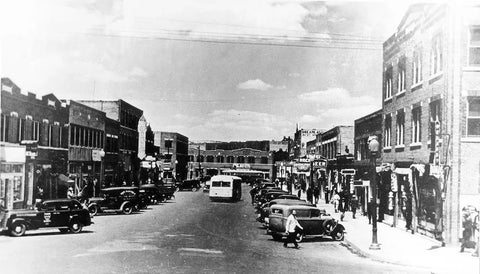
O.W. Gurley: Building Black Wall Street from Dust, Facing Ashes with Dignity
Share Black History
We felt it was only appropriate to start with our hero and historical mentor, the legendary O.W. Gurley.
From Cotton Fields to Black Wall Street: O.W. Gurley's Legacy of Defiance and Dreams.
Imagine it: a bustling, thriving city within a city, its streets teeming with Black-owned businesses, schools, and laughter. A place where doctors, bankers, and artists built their dreams, brick by brick, defying the suffocating grip of racism in early 20th-century America. This wasn't some utopian fantasy; it was Greenwood Avenue in Tulsa, Oklahoma, better known as Black Wall Street, and the man behind its rise was none other than O.W. Gurley.
Gurley's story wasn't paved with privilege. Born in Mississippi in 1868 to formerly enslaved parents, he knew firsthand the sting of discrimination. But Gurley wasn't one to bend to the whims of hate. He was a firecracker, fueled by a fierce determination to forge his own path. He started small, opening a grocery store in his hometown, a beacon of self-reliance in a sea of prejudice. But Gurley's ambitions stretched far beyond a single store.
In 1905, Oklahoma beckoned with the promise of oil and opportunity. Gurley, sensing the wind of change, arrived in Tulsa, a rough-and-tumble town hungry for prosperity. He saw not just another boomtown, but a blank canvas on which to paint a masterpiece of Black empowerment. With forty dusty acres and a heart full of dreams, Gurley laid the foundation for what would become Black Wall Street.
Greenwood Avenue blossomed under his vision. Brick buildings sprouted, housing Black-owned businesses of every kind: grocery stores, banks, pharmacies, a vibrant theater, and even a flying school. Gurley himself built the Gurley Hotel, a haven for Black travelers weary of segregation. Black doctors treated patients, Black lawyers fought for justice, and Black teachers nourished young minds. It wasn't just a street; it was a community, a testament to the boundless potential of Black Americans when given the chance to thrive.

But the embers of hatred still flickered beneath the surface. In 1921, a spark ignited a firestorm of unimaginable fury. A false accusation against a young Black man triggered a white mob, unleashing a wave of violence that would forever scar Tulsa's soul. Black Wall Street, the symbol of Black progress, was razed to the ground. Gurley lost everything: his hotel, his businesses, his life savings – all devoured by the flames of hate.

Yet, even from the ashes, Gurley's spirit rose unbroken. He rebuilt, not just his life, but the spirit of his community. He became a voice for justice, demanding reparations and accountability for the Tulsa massacre. He never wavered, his unwavering resolve a testament to the resilience that coursed through his veins.
Gurley's story isn't just about the past; it's a call to action for the present. It's a reminder that the fight for equality, for true economic parity, is far from over. It's a challenge to each of us to pick up the torch Gurley carried, to continue building on the foundation he laid, brick by brick, dream by dream.
We must remember Greenwood Avenue (which still exists), not as a relic of the past, but as a blueprint for the future. A future where Black Wall Streets rise not from ashes, but from fertile ground, fueled by the collective fire of our defiance and our dreams. Gurley's legacy isn't just a story; it's an invitation to join the movement, to be the architects of a world where every street hums with the vibrant energy of self-determination, where every corner echoes with the laughter of dreams taking flight.
Let's honor Gurley not just with words, but with action. Let's support Black businesses, advocate for economic justice, and amplify the voices of those still struggling against the shackles of systemic racism. Let's build our own Black Wall Streets, not just in physical spaces, but in our hearts, in our communities, in our unwavering commitment to a more just and equitable future.
Together, we can rise from the ashes of the past and build a future where every dream, every ambition, every life has the chance to blossom, unburdened by the weight of prejudice. That's the true legacy of O.W. Gurley, and it's a legacy we all have a responsibility to carry forward.
#BlackWallStreet #blackhistory #ShopBlack

